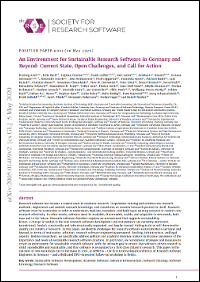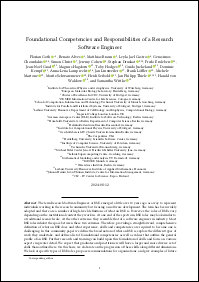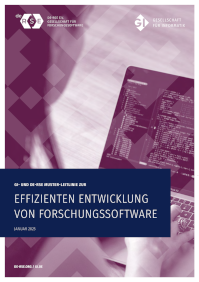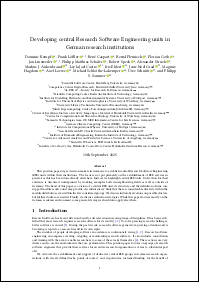Positionen
Als de-RSE e.V. - Gesellschaft für Forschungssoftware entwickeln und beziehen wir Positionen zu verschiedenen Aspekten rund um Forschungssoftware und zu Themen, die involvierte Personen, Gruppen, Strukturen und Institutionen betreffen. Hierbei nehmen wir den Standpunkt einer heterogenen Community ein, die Research Software Engineers über das gesamte Spektrum der Rollen und Selbstverständnisse umfasst und übernehmen deren Vertretung im öffentlichen Diskurs.
Unsere Positionen sind das Ergebnis öffentlicher Community-Prozesse, den alle Mitglieder der Gesellschaft aktiv gestalten. Dieses Prozessmodell beinhaltet offene Calls for Contribution, kollaborative Entwicklung, öffentliche Gutachtenprozesse und darauf basierende Entscheidungen.
Vertreten Mitglieder von de-RSE e.V. berechtigterweise die Gesellschaft in der Öffentlichkeit, vertreten sie in relevanten Diskursen auch die angenommenen Positionen.
Inhalt
Positionspapiere - offizielle Positionen von de-RSE e.V. - Gesellschaft für Forschungssoftware
Work in progress - Positionen, an denen derzeit gearbeitet wird Entwicklungsprozess - Übersicht, wie Positionen von de-RSE e.V. erarbeitet werden
Positionspapiere
Position 001 - An Environment for Sustainable Research Software in Germany and Beyond: Current State, Open Challenges, and Call for Action (2020)
 |
Abstract: Research software has become a central asset in academic research. It optimizes existing and enables new research methods, implements and embeds research knowledge, and constitutes an essential research product in itself. Research software must be sustainable in order to understand, replicate, reproduce, and build upon existing research or conduct new research effectively. In other words, software must be available, discoverable, usable, and adaptable to new needs, both now and in the future. Research software therefore requires an environment that supports sustainability. Hence, a change is needed in the way research software development and maintenance are currently motivated, incentivized, funded, structurally and infrastructurally supported, and legally treated. Failing to do so will threaten the quality and validity of research. In this paper, we identify challenges for research software sustainability in Germany and beyond, in terms of motivation, selection, research software engineering personnel, funding, infrastructure, and legal aspects. Besides researchers, we specifically address political and academic decision-makers to increase awareness of the importance and needs of sustainable research software practices. In particular, we recommend strategies and measures to create an environment for sustainable research software, with the ultimate goal to ensure that software-driven research is valid, reproducible and sustainable, and that software is recognized as a first class citizen in research. This paper is the outcome of two workshops run in Germany in 2019, at deRSE19 - the first International Conference of Research Software Engineers in Germany - and a dedicated DFG-supported follow-up workshop in Berlin. |
-
Autor/inn/en: Hartwig Anzt, Felix Bach, Stephan Druskat, Frank Löffler, Axel Loewe, Bernhard Y. Renard, Gunnar Seemann, Alexander Struck, Elke Achhammer, Piush Aggarwal, Franziska Appel, Michael Bader, Lutz Brusch, Christian Busse, Gerasimos Chourdakis, Piotr W. Dabrowski, Peter Ebert, Bernd Flemisch, Sven Friedl, Bernadette Fritzsch, Maximilian D. Funk, Volker Gast, Florian Goth, Jean-Noël Grad, Sibylle Hermann, Florian Hohmann, Stephan Janosch, Dominik Kutra, Jan Linxweiler, Thilo Muth, Wolfgang Peters-Kottig, Fabian Rack, Fabian H.C. Raters, Stephan Rave, Guido Reina, Malte Reißig, Timo Ropinski, Joerg Schaarschmidt, Heidi Seibold, Jan P. Thiele, Benjamin Uekerman, Stefan Unger, Rudolf Weeber
- Community Reviews: 23. Januar 2020 - 09. Februar 2020
- Akzeptiert als offizielle Position: 03. April 2020
- Volltext: F1000Research; [arXiv:2005.01469 [cs.GL]
- Zitieren: Anzt H, Bach F, Druskat S et al. An environment for sustainable research software in Germany and beyond: current state, open challenges, and call for action [version 2; peer review: 2 approved]. F1000Research 2021, 9:295 (https://doi.org/10.12688/f1000research.23224.2). [BibTeX]
Position 002 - Foundational Competencies and Responsibilities of a Research Software Engineer
 |
Abstract: The term Research Software Engineer, or RSE, emerged a little over 10 years ago as a way to represent individuals working in the research community but focusing on software development. The term has been widely adopted and there are a number of high-level definitions of what an RSE is. However, the roles of RSEs vary depending on the institutional context they work in. At one end of the spectrum, RSE roles may look similar to a traditional research role. At the other extreme, they resemble that of a software engineer in industry. Most RSE roles inhabit the space between these two extremes. Therefore, providing a straightforward, comprehensive definition of what an RSE does and what experience, skills and competencies are required to become one is challenging. In this community paper we define the broad notion of what an RSE is, explore the different types of work they undertake, and define a list of foundational competencies as well as values that outline the general profile of an RSE. Further research and training can build upon this foundation of skills and focus on various aspects in greater detail. We expect that graduates and practitioners will have a larger and more diverse set of skills than outlined here. On this basis, we elaborate on the progression of these skills along different dimensions. We look at specific types of RSE roles, propose recommendations for organisations, and give examples of future specialisations. An appendix details how existing curricula fit into this framework. |
-
Autor/inn/en: Florian Goth, Renato Alves, Matthias Braun, Leyla Jael Castro, Gerasimos Chourdakis, Simon Christ, Jeremy Cohen, Stephan Druskat, Fredo Erxleben, Jean-Noël Grad, Magnus Hagdorn, Toby Hodges, Guido Juckeland, Dominic Kempf, Anna-Lena Lamprecht, Jan Linxweiler, Frank Löffler, Michele Martone, Moritz Schwarzmeier, Heidi Seibold, Jan Philipp Thiele, Harald von Waldow, Samantha Wittke
- Community Reviews: 25. Juli 2024 - 09. August 2024
- Akzeptiert als offizielle Position: 19. September 2024
- Volltext: F1000Research; [arXiv:2311.11457 [cs.SE]
- Zitieren: Goth F, Alves R, Braun M et al. Foundational Competencies and Responsibilities of a Research Software Engineer: Current State and Suggestions for Future Directions [version 2; peer review: 2 approved]. F1000Research 2025, 13:1429 (https://doi.org/10.12688/f1000research.157778.2) [BibTeX]
Position 003 - GI- und de-RSE Muster-Leitlinie zur Effizienten Entwicklung von Forschungssoftware
 |
Einleitung: Diese Muster-Leitlinie bietet einen Rahmen für die Entwicklung, Verwaltung und Weitergabe von Software an der jeweils nutzenden Universität, Hochschule oder dem Forschungszentrum. Sie eignet sich auch für standortübergreifende Verbundforschungsvorhaben, insbesondere wenn die Projektbeteiligten der verschiedenen Universitäten, Hochschulen und Forschungszentren kompatible Fassungen nutzen. |
-
Autor/inn/en: Andreas Czerniak, Adrian Ehrenhofer, Bernadette Fritzsch, Maximilian Funk, Florian Goth, Reiner Hähnle, Carina Haupt, Marco Konersmann, Jan Linxweiler, Frank Löffler, Alexander Lüpges, Sebastian Nielebock, Bernhard Rumpe, Ina Schieferdecker, Tobias Schlauch, Robert Speck, Alexander Struck, Jan Philipp Thiele, Matthias Tichy, Inga Ulusoy
- Community Reviews: 19. Augusst 2024 - 30. September 2024
- Akzeptiert als offizielle Position: 17. Oktober 2024
- Volltext: doi: 10.18420/2025-gi_de-rse
Position 004 - Establishing central research software engineering units in german research institutions
 |
Abstract: This position paper urges decision makers in Germany to establish central Research Software Engineering (RSE) units within their institutions. The focus is not put primarily on the establishment of RSE services in general, as this has been done already elsewhere. Instead, we highlight central RSE units. Motivation for their existence is discussed, underpinned by working examples both in neighbouring fields as well as outside of Germany. The heart of this paper is a vision of a central RSE unit, its structure, and the definition of nine core support modules such a unit may provide. An initial survey finds that there is considerable diversity within the module distribution, even within the few considered groups. We discuss initial observations on possible clusters, but further studies are needed. Finally, we discuss realisation strategies. While this paper focuses mostly on the German academic environment, some general strategies should also apply elsewhere. |
-
Autor/inn/en: Dominic Kempf, René Caspart, Bernd Flemisch, Florian Goth, Jan Linxweiler, Frank Löffler, Philipp Matthias Schäfer, Robert Speck, Alexander Struck, Markus J. Ankenbrand, Leyla Jael Castro, Iris Ehlert, Jean-Noël Grad, Magnus Hagdorn, Axel Loewe, Michael Schlottke-Lakemper, Uwe Schmitt, Philipp S. Sommer
- Community Reviews: 23. Februar 2025 - 23. März 2025
- Akzeptiert als offizielle Position: 27. März 2025
- Volltext: https://de-rse.org/2023_paper-RSE-groups/paper.pdf (submitted to F1000)
Work in progress
Folgende Positionen sind derzeit in Arbeit.
Entwicklungsprozess
Der Entwicklungsprozess für die Positionen der Gesellschaft wurde durch die Mitglieder gestaltet und kann bei Bedarf durch die Mitglieder verändert werden. Er verläuft in drei Phasen, die wie folgt gestaltet sind.
1. Aufruf- und Arbeitsphase
- Call for Collaboration: Initiatorinnen und Initiatoren einer Position kündigen das Thema auf der Mailingliste der Gesellschaft (liste@de-rse.org, mit Thema
[Call for Contribution]) an und rufen die Mitglieder zur Mitarbeit auf. Dabei werden Hauptautorinnen und -autoren des Positionstextes benannt und die Bedingungen für Mitautorschaft erläutert. - Zusammenarbeit: Zusammenarbeit beginnt auf einer bevorzugt öffentlichen Plattform nach Wahl der Initiatorinnen und Initiatoren (*Pad, Repository, hackmd.io, Overleaf, o.ä.). Das Projekt wird gleichzeitig vorgestellt und verlinkt auf der de-rse.org Website unter “Positionen” > “Work in progress” (per Pull Request gegen die Positionen-Seiten (de/en) auf https://github.com/DE-RSE/de-rse.github.io).
2. Begutachtungsphase
- Veröffentlichung: Nach Fertigstellung eines zur Veröffentlichung vorgeschlagenen Entwurfs wird dieser zur Begutachtung freigegeben:
- Soll die Position auf der de-RSE-Website unter “Positionen” veröffentlicht werden, wird ein entsprechender Pull Request (PR) gegen https://github.com/DE-RSE/positions/ gestellt (Entwurfsdateien in einem dedizierten Unterordner).
- Ist eine andere Veröffentlichungsform vorgesehen, wird ein entsprechendes Issue auf https://github.com/DE-RSE/projekte eröffnet, das einen Link zum Entwurf enthält.
- Call for Reviews: Die Entwurfsveröffentlichung wird wiederum über die Mailingliste (liste@de-rse.org, mit Thema
[Call for Reviews]) bekanntgegeben, mit Link zum Pull Request/Issue. Die Mitgliedschaft wird zur Begutachtung bis zu einem geeigneten Termin aufgerufen. - Begutachtung: Die Mitgliedschaft begutachtet öffentlich den Entwurf im PR/Issue. Sollte der Entwurf eine kontroverse Diskussion initiieren, ist der PR/Issue mit einem Label
[Kontroverse]zu markieren. Kontroverse Diskussionen/Gutachten sind solche, die in einem Peer-Review-Verfahren zu einer ablehnenden Entscheidung oder eine “Major revision” führen würden.
3. Entscheidungsphase
- Entscheidung: Der Vorstand entscheidet, ob die vertretenen Positionen als “offizielle” Position von de-RSE e.V. - Gesellschaft für Forschungssoftware eingestuft werden:
- Bei Diskussionen, die nicht als kontrovers gekennzeichnet wurden, wird die Entscheidung von mindestens einem Vorstandsmitglied getroffen.
- Bei kontroversen Diskussionen/Gutachten entscheidet der Vorstand in einer Vorstandssitzung nach Möglichkeit im Konsens. Kann eine Einigung nicht gefunden werden, entscheidet der Vorstand mit einfacher Mehrheit.
- Umsetzung: Eine Freigabe zur Veröffentlichung als Position des de-RSE e.V. wird umgesetzt entweder als Mergen und Schließen des entsprechenden Pull Request und Veröffentlichung der Position auf der Website, oder als Imprimatur-Kommentar (“Freigabe”) und Schließen des entsprechenden Issue. Erfolgt keine Freigabe, kann der Vorstand den Entwurf zur Überarbeitung zurück an die Autorenschaft geben, dies wird im entsprechenden Issue/PR per Kommentar vermerkt. Hierbei sind Hinweise zu benötigten Änderungen zu geben. Alternativ kann der Vorstand den Entwurf ablehnen. Hierbei werden Issue/PR mit entsprechendem Kommentar geschlossen und es erfolgt keine Veröffentlichung.
